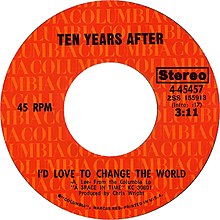I'd Love to Change the World
| "I'd Love to Change the World" | ||||
|---|---|---|---|---|
 |
||||
| Single by Ten Years After | ||||
| from the album A Space in Time | ||||
| B-side | "Let the Sky Fall" | |||
| Released | 1971 | |||
| Format | 7" single | |||
| Genre | ||||
| Length | 3:44 | |||
| Label | Columbia | |||
| Writer(s) | Alvin Lee | |||
| Producer(s) | Chris Wright | |||
| Ten Years After singles chronology | ||||
|
||||
"I'd Love to Change the World" is a song by the British blues rock band Ten Years After. Written by Alvin Lee, it is the lead single from the band's 1971 album A Space in Time. It is the band's most famous and popular song, as it was their only Top 40 hit, peaking at number 40 on the Billboard Hot 100.
The song was written and sung by Alvin Lee. The song reflects the widespread confusion concerning world events in the timeframe when it was written. The Vietnam War ended just three years after this song was released, hence the lyrics, "Them and us, stop the war." One interpretation of the song, with lyrics such as "Tax the rich, feed the poor/ 'til there are no rich no more," is that it is an ironic commentary on the standard countercultural position on social and political issues.
The song features a folk-inspired chord pattern to support the melody.
"I'd Love to Change the World" was the band's highest charting single. It peaked at number 40 on the Billboard Hot 100 in 1971. When it was released, "I'd Love to Change the World" was staple of both FM and AM radio, a rarity for the time.
The song was generally well received by music critics. Billy Walker of Sounds wrote that the "Acoustic guitar, echoing vocals and electric guitar build up the tempo with very good cool electric passages by Alvin [Lee], and while there's nothing new developing it's a very nice track." Matthew Greenwald of Allmusic highlighted Lee's guitar work as the "most expressive -- and most tasteful -- electric guitar performance of his career," and added "if there is a single song that can describe the overall vibe of the counterculture in 1969/1970, this may very well be it. The band and Lee never quite matched the song's supple power in their later efforts, but this song is representation enough of their awesome artistry."
...
Wikipedia
